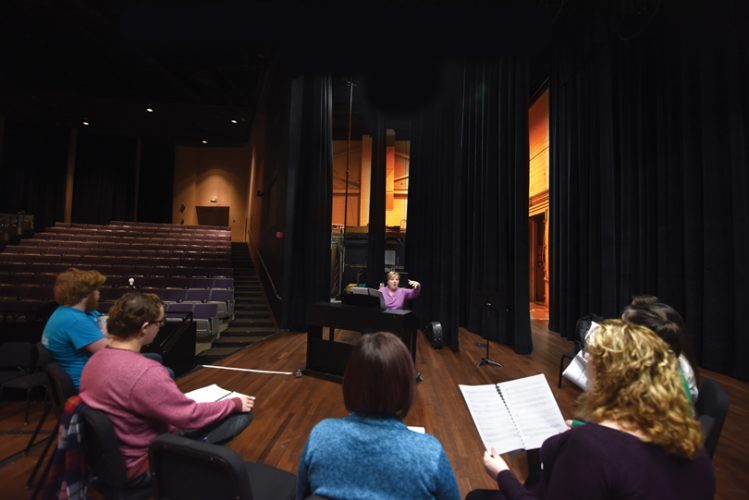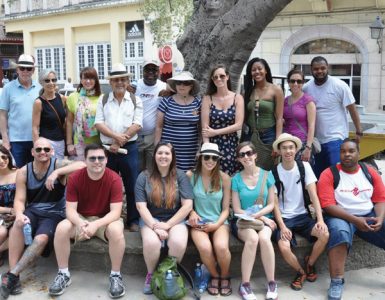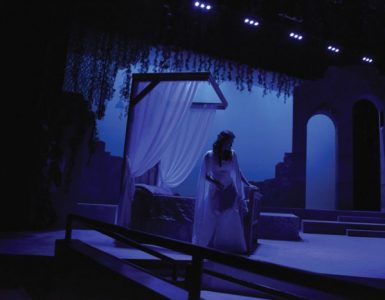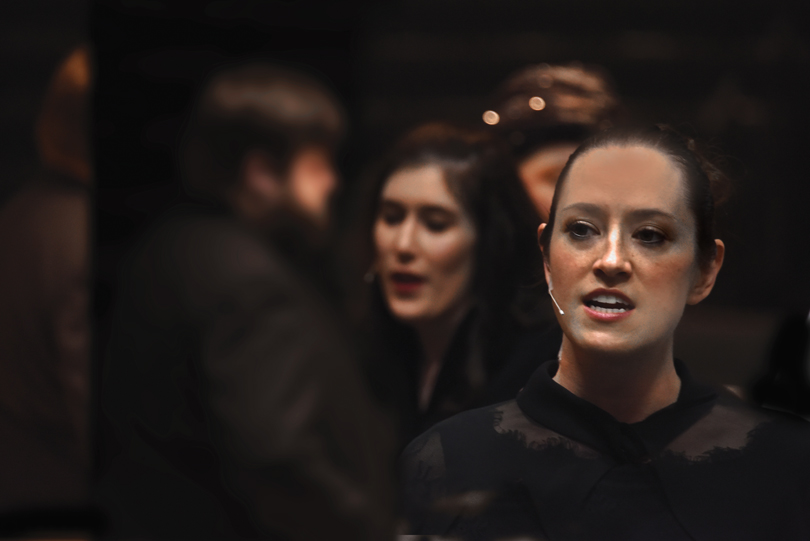
For Distinguished Alum and composer Mark Swanson, melody is the engine that drives a musical forward. But when you’re teaming up with an esteemed director, the retired professor who helped a former writer in residence bring her novel to fruition and a talented troupe of actors, many of whom are current or former students, you’ve got plenty of fuel as well. And no shortage of horsepower.
Opening Night
It’s a little after 7:30 p.m. on Thursday, Jan. 24 — opening night for Here to Get My Baby Out of Jail, an original musical that’s bursting with Augusta University connections — and as audience members descend the aisles of the Maxwell Theatre, choosing their seats and scanning the crowd for familiar faces, they can’t help but glance up at the exposed stage, which offers a tantalizing hint at the evening ahead.
Four pews. A coffin. An old-fashioned radio as big as a jukebox.
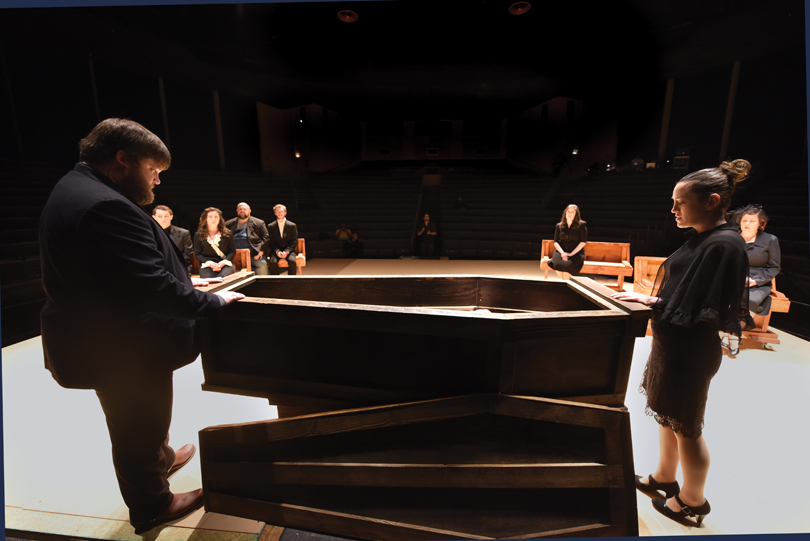
Behind that, a keyboard and an arc of chairs for a band you suspect might be gearing up to play something along the lines of the newgrass music being piped into the theater.
And behind that, a backdrop blue enough to charm the bird off the program’s cover.
So what if there’s a crew member with a cordless drill making last-minute adjustments to the stage? That’s normal, right? For a world premiere?
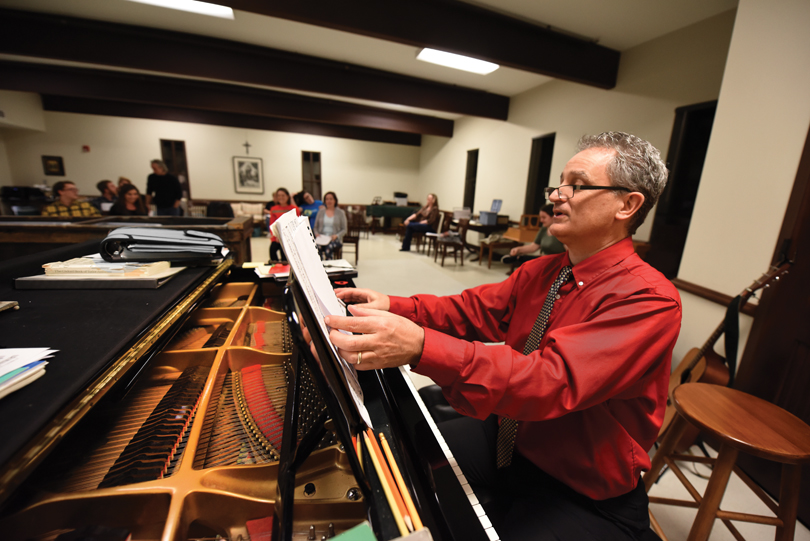
Three Weeks Out
Sitting at the piano in the second-floor music room of Summerville’s Church of the Good Shepherd, the show’s rehearsal space until it can move over to the Maxwell, Mark Swanson (BM ’93) exudes a kind of fatherly calm. Later, he’ll admit to being frustrated by the slow pace of the evening’s rehearsal (“that’s probably just a composer wanting to hear the music”), but for all appearances, he’s relaxed and enjoying the work the actors are doing with director Doug Joiner (BA ’92). And really, he is (“Doug is amazing, especially when the actors are open to being vulnerable on stage”); it’s just that he wants to get on with it. Get to the music. The songs.
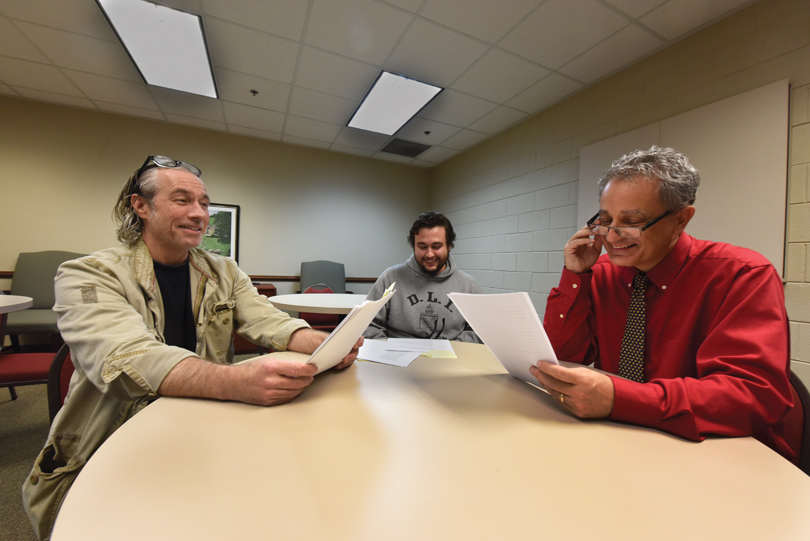
Joiner, on the other hand, is a study in focused movement, his hard-soled boots telegraphing his movements as he shifts this way and that, active but never restless. He’s working with the actors line by line, expression by expression — interrupting to make changes or offer encouragement. He’s sculpting a performance as much as anything, yet it’s never dictatorial or iron-fisted. Often, he’ll direct by taking cues from the choices made by the actors themselves.
“You had a good thought!” he says, pointing aggressively at one of the actresses, who closed her eyes during the delivery of a key line. “Do that. Do that again.”
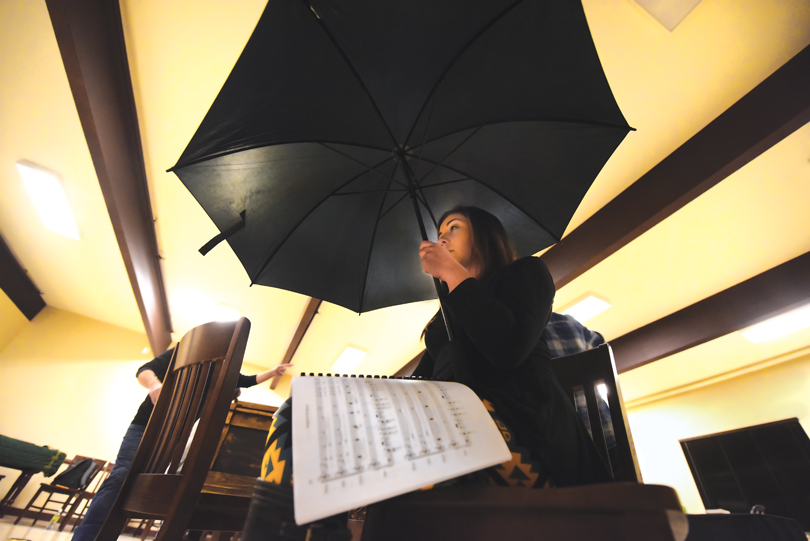
So she does. Again and again. And that element, that little nuance — the smallest of human gestures — gets filed away and becomes one of the tiny bits of life eventually brought to the stage, one of a thousand little details that join together to build authenticity and, if they’re lucky, the trust of the audience.
At the piano, Swanson smiles at the moment, then turns away to leaf impatiently through the score.
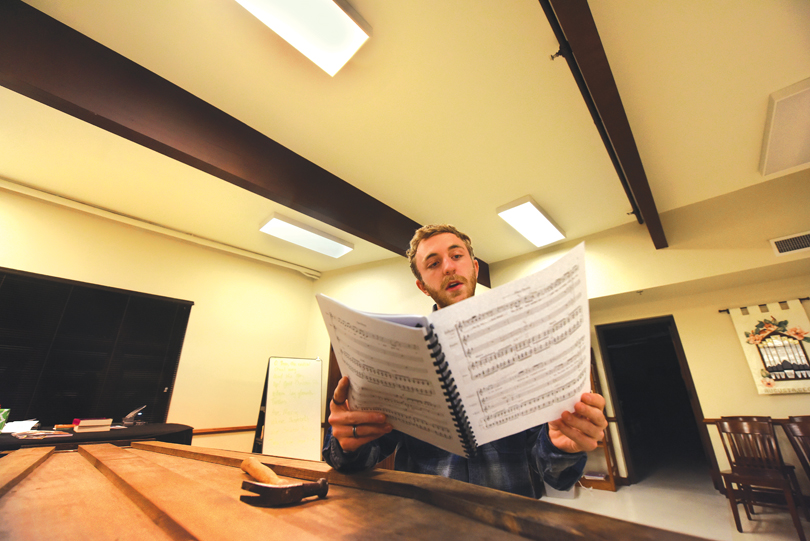
When Joiner, well-respected in the community as an insightful, dynamic director, approached Swanson with the idea of doing a musical based on former writer in residence Louise Shivers’ highly honored novel about love and loss in the tobacco fields of North Carolina, Swanson was particularly vulnerable. He had just wrapped up Hypatia of Harlem, a commissioned one-act piece for the Jessye Norman School of the Arts in Augusta, and though tired, he was already antsy for the next project and susceptible to the idea of working once again with his good friend, Joiner.
It’s a great story, Joiner told him. We’re going to do it in 2019. Are you on board?
This was back in July, when 2019 seemed a long way off.
Swanson said yes, and a couple of weeks later, Joiner came back with the actual date — when exactly in 2019 it was set to open.
“Jan. 24 is not 2019!” Swanson complained, but by then it was too late. They had a full musical to write, Joiner penning the book and Swanson writing the songs; they had funding from the Porter Fleming Foundation to do it; and they had time — just not a lot of it, and what they had was ticking away fast.
Six months is not a reasonable amount of time to write a musical.
It wasn’t the first time the two had worked together under a tight deadline. Misconception: The Lost Gospel of Christmas, a popular musical that debuted at Le Chat Noir in Augusta and went on to play the 2013 CapitalFringe Festival in Washington, D.C., was initially stood up in about as much time, but while that show was in no way easy, it did come wrapped in certain advantages: It was built
from the Bible, and the music was rock-based, two things
very much in Swanson’s creative wheelhouse.
And Swanson’s other
musical project, A Scythe of Time, which was produced at the prestigious New York Musical Festival, resulted from a two-year collaboration with full-time professionals.
But this? This was neither of those things.
“I don’t think I’ve ever been more uncomfortable starting a project in my life,” Swanson said. “Why? Because it’s set in rural North Carolina in 1937, and that’s bluegrass. That’s country. I’ve written a rock opera, and I’ve written an orchestral type of musical, but never anything remotely like this.”
And there was another thing — while the musical underpinnings might have been bluegrass and country, he knew that even if he could pull it off, a mainstream theater audience would quickly tire of a steady stream of twang. In other words, it had to be bluegrass — just not too bluegrass.
That led to the decision to have a string quartet in the orchestra. In theory, the open chords from the string quartet would take the edge off of the banjo and the mandolin, and the acoustic guitar he wrote into the music would help bridge the two.
In theory.
In spite of the obstacles, he found himself creatively challenged by this new musical landscape, by the need to reach beyond himself.
And besides, no matter how rough things got, he had an ace in the hole, that thing that never fails to get him out of whatever musical jam he gets himself into: the gift of melody. Because if there’s one thing he knows, something that was confirmed by the late Dr. Eloy Fominaya, his composition instructor back in his days as a music student, it’s that he can write a good melody.
“Melody is the engine that makes it go,” he said. “Once I have the melody, the lyrics come.”
And when the source material is as lyrical as Shivers’ book — boy, do they come.
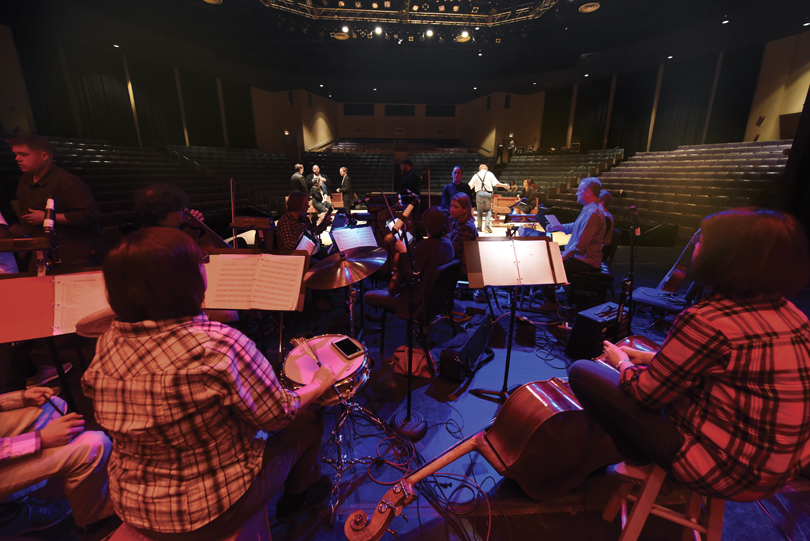
Two Weeks Out
Swanson’s at his spot at the piano again, but this time he’s not waiting for an opportunity to work; he’s hammering out a section with a couple of the male singers — the grave diggers, one of whom is a late replacement (Late replacement! Two weeks out!) — and though he’s fully engaged, he’s looking thin and tired, and he’s obviously completely focused on the work yet to be done because he’s not even allowing himself the briefest of smiles at the progress that’s occurred in just a week. And that progress is remarkable.
The song he’s fine-tuning with the grave diggers — “Face Down” — is musically complex, with surprising stops and starts and an abrupt interplay between the grave diggers and the female chorus. And while last week had all of them standing around the piano glued to the music, slogging through it measure by brutal measure, tonight, the chorus is scattered throughout the room doing other things, seemingly half-listening to the work Swanson is doing with the male singers. And yet, almost as an afterthought, they chime in exactly when required. Effortlessly. Thoughtlessly. Beautifully.
It’s an amazing moment, yet it’s hard to say if Swanson feels any sense of satisfaction in this because who should walk in right then — right then — but Dr. Walter Evans, the retired English professor who not only set this project in motion by suggesting it to Joiner but also worked with Shivers on early drafts, helping the book itself see the light of day. And who does he have with him? Beth Siciliano, of course. Shivers’ daughter.
No pressure there.
When Walter Evans was first introduced to Louise Shivers, she was a shy, withdrawn housewife who had aspirations to write, first as a poet and later as a fiction writer. She had talent, but more importantly, she had tenacity — enough to come up with a book: some 400 manuscript pages about a husband and a wife and a hired hand, though like any good novel, it was about more than that. It was about the nature of love, the mysteries of life, the shackles of expectations, the cost of freedom. But always it was about Roxy.
“Louise had this voice of the central character, Roxy, that was just beautiful,” Evans said. “That’s where the poetry she started off writing came in. But to me her poetry was better coming out of Roxy’s mouth as prose than most of her poetry was as poetry.”
The problem, however — identified by Evans, the novelist Mary Gordon, Shivers’ literary agent and nearly everyone else who read the original drafts — was that she insisted on switching point of view from chapter to chapter.
Eventually, when the publisher’s editor insisted, she took the advice, focused on Roxy and cut the story down by more than half. It was named best first novel of 1983 by USA Today, earning Shivers comparisons to Flannery O’Connor among others and giving her the extras that come with literary fame — speaking engagements, conference appearances, a movie deal (which became 1987’s Summer Heat) and writer in residence positions in Florida and later, for 25 years, at Augusta University.
According to Evans, the exposure that later association brought the department was beneficial not just in terms of stature, but for the encouragement her improbable success gave the students, many of whom were looking at odds just as formidable as hers.
“It gives students faith that good things are possible,” Evans said.
Which is one of the reasons, all these years later, he found himself championing the musical.
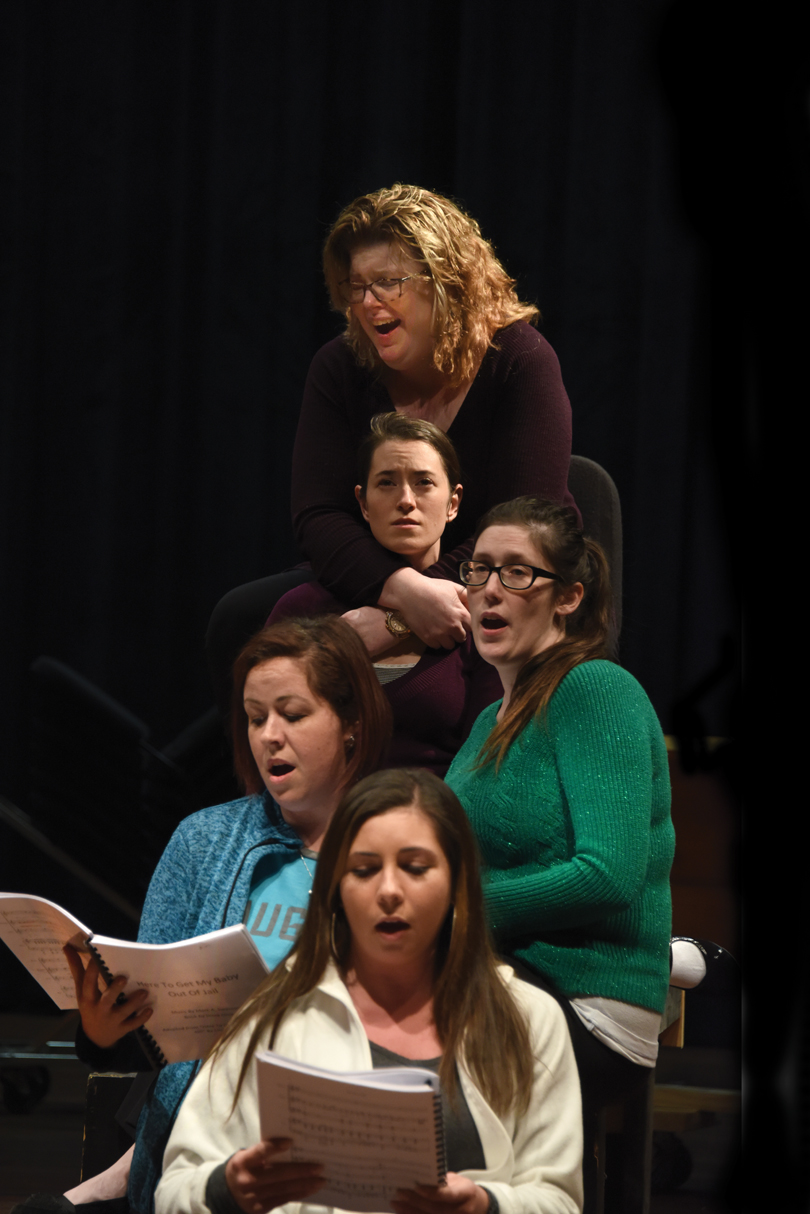
Sitzprobe (Four Days Out)
The stage of the Maxwell Theatre looks like any other rough and empty stage with the exception of the piano and the chairs set up for the orchestra, which will be led by Augusta University music instructor Carl Purdy, who as the director of the Sand Hills String Band seems a perfect choice for the role.
Backstage, Swanson stands at a table working his Fellowes Binding Machine, inserting musical changes into the bound score. A small investment he made before starting Misconception in 2011, the machine has been worth its weight in gold, Swanson says, and it’s been with him ever since.
“Must be exciting to see it all come together,” someone says.
Swanson laughs, and the implication is lost on no one: It hasn’t come together yet.
Because time is becoming the most precious of commodities, the plan tonight is to move efficiently through the musical numbers. First, the orchestra will play each song alone, ironing out any issues they might have, and then they will perform the number again with the cast members, who are lined up on stage facing them.
Sitzprobe is theatrespeak (German actually) for the first meeting of the orchestra and the singers. Literally, seated rehearsal.
By itself, the music sounds good, but to the untrained ear it’s just accompaniment. Incidental music. Even for Swanson, who as creator has heard it in his head hundreds of times, it’s lacking without the singers.
But when the two combine — when it becomes a unified thing full of intention and meaning — the show suddenly, instantly, becomes real. And that’s when the full scope of it becomes clear. It has been built from nothing. Note by note, line by line. And tonight, for the first time, the various musical pieces of the show are fitting together.
“We got to that moment, and I heard the strings, and I said to myself, ‘Mark, you’ve really done something here,’” Swanson says later. “That’s the moment when I realized, ‘This is going to work.’”
They march through the score number by number, and all of it is beautiful — distractingly beautiful. But not quite distracting enough not to notice the fact that Joiner has been there all the time, too, but instead of working with the actors, he’s had a pencil behind his ear and a tape measure on his belt, and he’s been scurrying around a stage that seems to have an awful lot of exposed wood for being four days from opening night.
Now you see him, now you don’t.
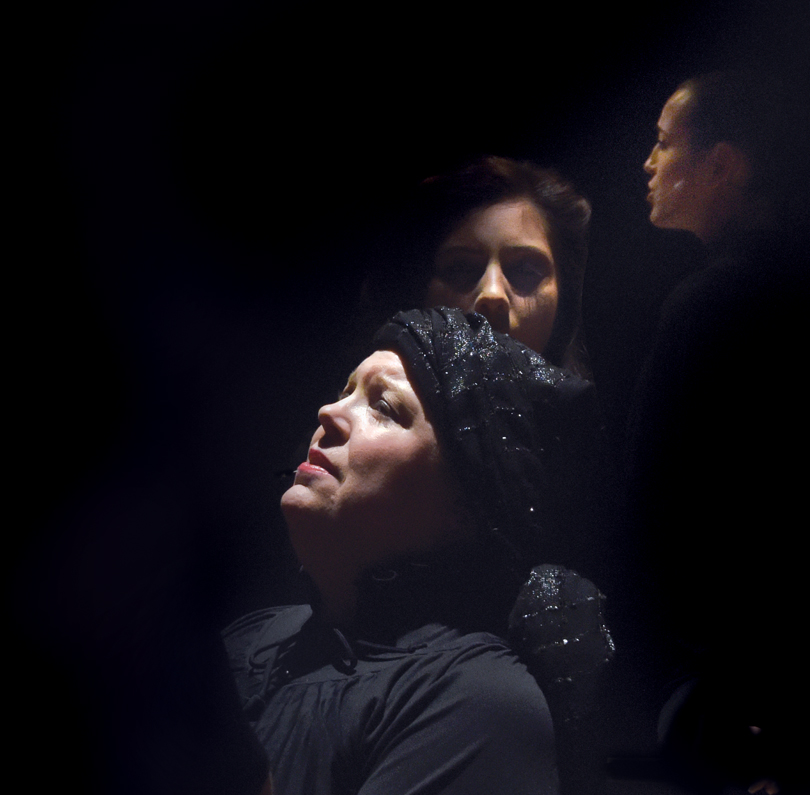
Opening Night (Reprise)
The crew member with the portable drill is joined by another, but they finish their work quickly, departing the stage about the time the orchestra members take their seats. They’re all wearing plaid shirts, as is Swanson, who sits at the keyboard, at once creator, participant and bystander. He looks calm and happy, and though it’s tough to tell for sure, he looks more than a little proud.
And as he smiles and cranes his neck to watch Evans — yep, he’s here, too, talking into a microphone, telling the audience the story of Louise Shivers and setting up the performance — there’s a moment where he seems to relax into a protective, almost radiating calm.
It’s the point of no return. Whatever’s going to happen is going to happen.
And then Evans leaves the stage. Swanson squares with the keyboard, nods at Purdy, and the orchestra begins to play.
Coda
A week after it’s all over, Swanson was exhausted but exhilarated by the experience. So exhilarated, in fact, that he was already talking in terms of next phases.
“I realized that I loved this piece that night at the sitzprobe,” he said. “And after the Friday night performance, I realized that it really has legs to go somewhere.”
The significance of Friday night should not be overlooked, because if something else becomes of this — something beyond the feat of creation and performance that’s just happened — it will be because of that night. That meeting between Swanson, Evans, another professor and a friend of Swanson’s from the Dramatists Guild.
The meeting started early, but it was still going strong at 2 a.m., and it didn’t involve backslapping and congratulations and the post-event chest-thumping that comes with pulling off the impossible. It was all about what more could be done with the show. Where else it might go.
And in the midst of all that, Swanson’s friend from the Dramatists Guild looked at him, smiled and said, “This is what it’s all about.”
And when you’re still talking that passionately about a show four hours after it’s over, how can you argue?

